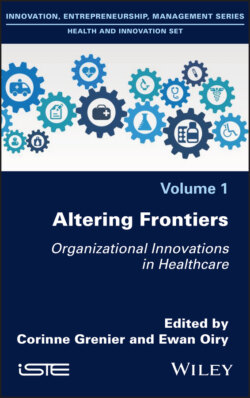Читать книгу Altering Frontiers - Группа авторов - Страница 25
1.6. References
ОглавлениеBoivin, A., Lehoux, P., Lacombe, R., Burgers, J., Grol, R. (2014). Involving patients in setting priorities for healthcare improvement: A cluster randomized trial. Implementation Sciences, 9(1), 1–10.
Boivin, A., Flora, L., Dumez, V., L’Espérance, A., Berkesse, A., Gauvin, F.-P. (2017). Transformer la santé en partenariat avec les patients et le public : historique, approche et impacts du “modèle de Montréal”. In La participation des patients, Collection Ethique biomédicale et normes juridiques, Editions Dalloz, Paris.
Boote, J., Telford, R., Cooper, C. (2002). Consumer involvement in health research: A review and research agenda. Health Policy, 61(2), 213–236.
Brown, P. (1987). Popular epidemiology: Community response to toxic waste-induced disease in Woburn, Massachusetts and other sites. Science, Technology and Human Values, 12(3–4), 76–85.
Coulter, A. (2011). Engaging Patients in Healthcare. Oxford University Press, Oxford.
Crocker, J.C., Ricci-Cabello, I., Parker, A., Hirst, J.A., Chant, A., Petit-Zeman, S., Evans, D., Rees, S. (2018). Impact of patient and public involvement on enrolment and retention in clinical trials: Systematic review and meta-analysis. BMJ, 363(8178) [Online]. Available at: https://doi.org/10.1136/bmj.k4738 [accessed 1 December 2018].
Durkheim, E. (1988). Les règles de la méthode sociologique. Flammarion, Paris.
Flora, L. (2012). Le patient formateur : élaboration théorique et pratique d’un nouveau métier de la santé. PhD Thesis, Université Vincennes Saint-Denis – Paris 8, Paris.
Foucault, M. (1963). Naissance de la clinique : une archéologie du regard médical. PUF, Paris.
Ghadi, V., Flora, L., Jarno, P., Lelievre, H. (2019). The engagement conundrum of French users. In Patient Engagement: How Patient-provider Partnerships Transform Healthcare Organizations, Pomey, M.-P., Denis, J.-L., Dumez, V. (eds). Springer, New York.
Houillet, F. (ed.) (2016). Les sciences participatives en France : état des lieux et méthodes. Report, Ministères de l’Éducation nationale et de l’Enseignement supérieur et de la recherche, Paris.
Jouet, E. (2014). La reconnaissance des savoirs des malades : de l’émergence au fait social. In Nouvelles interventions réflexives dans la recherche en santé : du savoir expérientiel des malades aux intervention des professionnels de santé. Archives contemporaines, Paris.
Jouet, E., Flora, L., Las Vergnas, O. (2010). Construction et reconnaissance des savoirs expérientiels des patients : note de synthèse. Pratique de formation : analyses, 58–59, 13–94.
Karazivan, P., Dumez, V., Flora, L., Pomey, M.-P., Del Grande, C., Guadiri, S., Fernandez, N., Jouet, E., Las Vergnas, O., Lebel, P. (2015). The patient as partner in care: Conceptual grounds for a necessary transition. Academic Medicine, 90(4), 437–441.
Le Breton, D. (1990). Anthropologie du corps et modernité. PUF, Paris.
Le Cardinal, P., Roelandt, J.-L., Rafael, F., Vasseur-Bacle, S., Francois, G., Marsili, M. (2013). Pratiques orientées vers le rétablissement et pair-aidance : historique, études et perspectives. L’Information psychiatrique, 89, 365–370.
Pomey, M.-P., Flora, L., Karazivan, P., Dumez, V., Lebel, P., Vanier, M.-C., Débarge, B., Clavel, N., Jouet, E. (2015). Le “Montreal model” : enjeux du partenariat relationnel entre patients et professionnels de santé. Santé publique, HS(S1), 41–50.
Raynault, A., Lebel, P., Brault, I., Vanier, M.-C., Flora, L. (2020). How interprofessional teams of students mobilized collaborative practice competencies and the patient partnership approach in a hybrid IPE course. The Journal of Interprofessional Care [Online]. Available at: https://doi.org/10.1080/13561820.20.
Vanier, M.C., Dumez, V., Drouin, E., Brault, I., MacDonald, S.A., Boucher, A., Fernandez. N., Levert, M.J. (2014). Partners in interprofessional education: Integrating patients-as-trainers. In Partnering with Patients, Families, and Communities to Link Interprofessional Practice and Education, Fulmer, T., Gaines, M. (eds). Josiah Macy Jr. Foundation, New York.
WHO (1986). Ottawa Charter [Online]. Available at: https://www.euro.who.int/__data/assets/pdf_file/0004/129532/Ottawa_Charter.pdf [accessed 8 December 2019].
1 1 Written by People with Aids (PWA) in 1983, available at: http://lemegalodon.net/a6507-les-principles-de-denver.html.
2 2 From Vesale to the Renaissance, medicine has been defined as being more interested in organs, the fragmentation of the indivisible individual and the aggression of disease, than in the patient (Le Breton 1990).
3 3 For example, TRT-5 for “treatment and therapeutic research” and “5” for the 5 associations behind the initiative against HIV/AIDS; then the Collectif interassociatif sur la santé (CISS) in France and the European Aids Treatment Group (EATG) in Europe.
4 4 While the complaints mainly incriminated the pharmaceutical laboratories in the United States – with foreign plaintiffs to whom the contaminated blood products were exported – in France it was a lawsuit against failing institutions and a questioning of policy that gave rise to the scandal, and in Canada it was the Red Cross and its officials who were quickly targeted by the complaints.
5 5 Recovery, initially initiated by Alcoholics Anonymous, is based on mutual aid between people living with the same illness, somatic or psychic. Individuals can thus manifest themselves through group dynamics, such as the self-help groups from which they come, or, as is increasingly developing in the 21st century, within a professionalized framework in the dual accompaniment of peers and health and social work professionals whose action is dedicated to their peers. A salutogenesis approach has therefore been developed as an alternative to the historical pathogenesis approach.
6 6 French health democracy has been initiated in other countries, mainly European, such as Belgium or Germany, without any of them having a framework law of this magnitude.
7 7 The etymology of individual, individuum in Latin, calls us precisely to consider the person as indivisible.
8 8 Organizations ranging from services to regional health agencies (Agences régionales de santé, ARS).
9 9 This has become a recommendation in the United States since the Macy’s founding workshop in 2014 and was initiated in 2019 at the Cote d’azur University in France with the Center of Excellence for Patient and Public Partnership (CI3P).
10 10 Bureau facultaire de l’expertise patient partenaire (BFEPP) a Partner Patient Expertise Faculty Office from 2010 to 2013, then Direction collaboration and partnership patient (DCPP) from 2013.
11 11 It is one of the proposals of the CEPPP organized around three streams: research, training and animation of communities of practice and therefore networks.
12 12 https://ceppp.ca/fr/ressources/.
13 13 https://ceppp.ca/fr/nos-projets/boite-a-outils-devaluation/.
Chapter written by Luigi FLORA.
